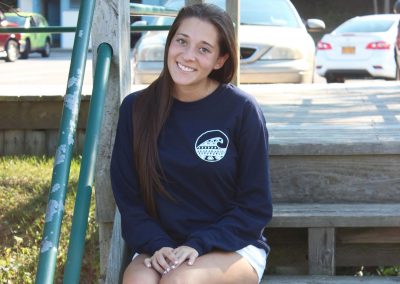
Having grown up in Commack, New York, Alexa Pisano said she attributes her love for beaches to living near many in Long Island. After taking a writing course called “Oceans: Past and Present,” she became inspired to spread awareness about current issues regarding the state of our oceans.
So, she started her own company.
This past July, the Questrom School of Business sophomore launched DeepBlue, a clothing and accessory company that donates 10 percent of every purchase to ocean conservation projects.
“No one really is aware of how serious [ocean depletion] is and how we’re the last generation who has a power to make a difference,” Pisano said. “If we don’t act now, then future generations don’t have anything left to save.”
The BU writing course served as her main inspiration, where she learned about the severity of ocean depletion.
“You just have to make the change that you can make, even if it’s just turning the lights off when you leave the room or showering for less time,” Pisano said.
Her teacher, graduate writing fellow Benjamin Kochan, gave sound advice during a lesson, she explained.
“Even the smallest changes really add up,” Pisano said. “So he really stressed that we didn’t have to drastically change our lives to make a difference.”
Another guiding force for Pisano was her parents, she said. Her parents both own businesses and were supportive of her through the process of creating her own business.
The first step was the legal procedure, where she had to apply as a limited liability company in the State of New York. Then, she used an e-commerce platform called Shopify to sell the products she had already created.
Now she has her own website platform called shopdeepblue.com. The organization prioritizes eco-friendly materials and shipping.
“Everything I use is biodegradable or 100 percent recyclable,” Pisano said. “So I don’t use plastic clothing tags, or when I ship, I use recyclable paper mailers to make sure that I’m not contributing to the problem I’m trying to make people aware of.”
Pisano mentioned that in order to make these adjustments, she looked at companies that had eco-friendly options and materials that were approved by the U.S. Food and Drug Administration and contacted them.
“A huge part of the company is to raise awareness and get people to understand what they can do to make a difference,” Pisano said.
Since launching, she has made an active effort to support ocean conservation projects from multiple organizations. She explained she actively researches companies before choosing which one to donate to.
By keeping her options open, she’s able to donate based on current, important issues that change from day to day.
Currently, Pisano said, she donates to Oceana, a nonprofit organization she finds to be successful at raising awareness through multinational work on multiple projects.
Pisano said she hopes to gain a larger following for her company through social media. Next summer, she plans to launch various new products with new styles, she said, but for now, her priority at the moment is to spread the word about DeepBlue.
“Next summer, I want to re-launch a bunch of new products and new styles, but right now it’s really important that I just spread the word,” she said. “I hope that eventually I’m able not only to donate a lot of sales to Oceana and other organizations, but also just to raise awareness.”
Pisano said her ultimate goal is to not only be able to donate a lot of the sales to Oceana and other organizations, but also to raise overall awareness.
On her website, she has information about small changes people can implement in their lives to save the oceans, such as reducing energy use, eating sustainable seafood, using reusable products and using less fertilizers.
“Even if someone visits the website and doesn’t necessarily spend money to purchase anything,” Pisano said, “I have information on the website about what they can do. So even if they implement a small change, I feel like I am still successful in some way because I brought attention to the problems that are occurring.”























































































































